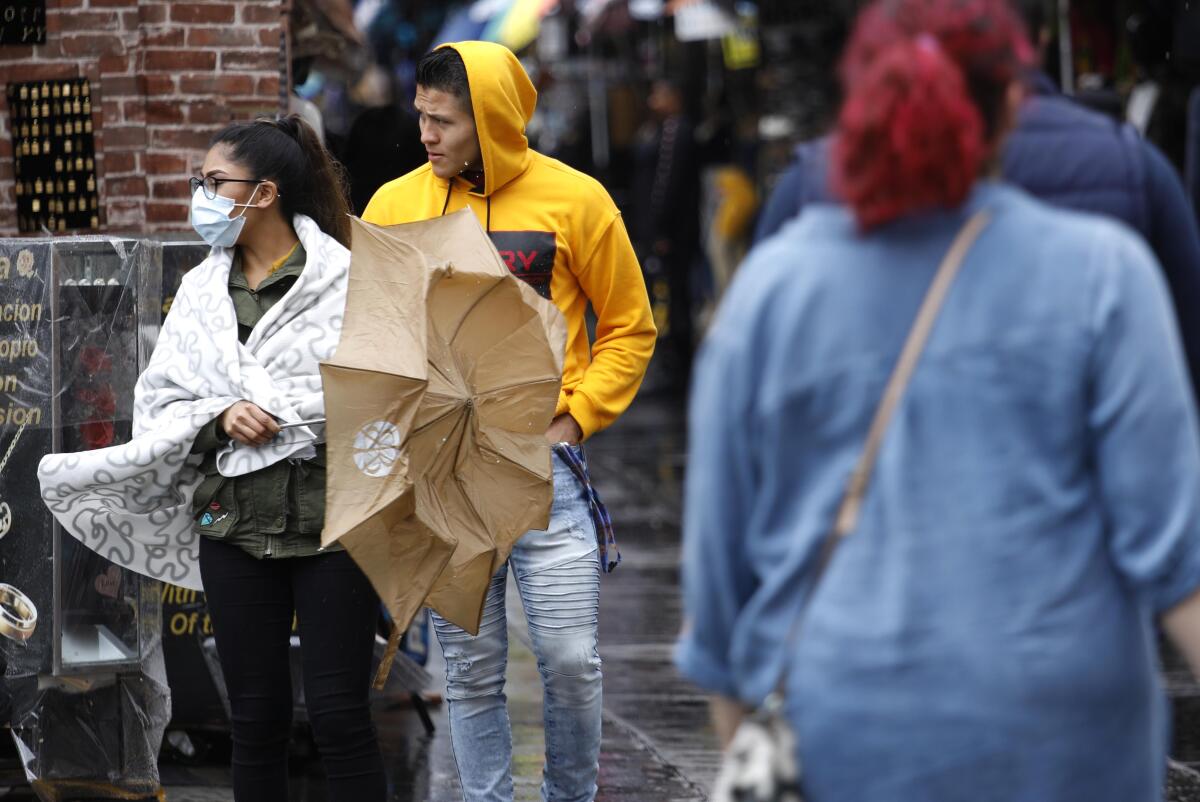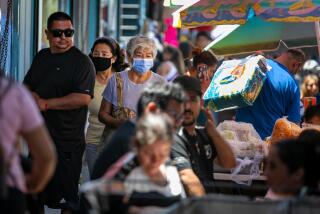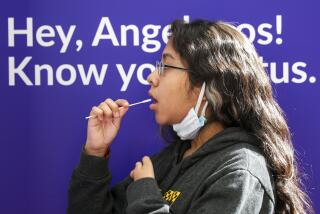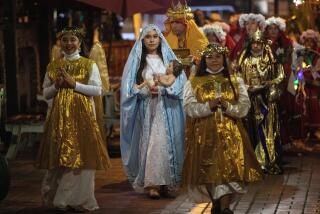Column: Coronavirus and the week that changed everything — for now

- Share via
We’re certainly not unfamiliar with disruption in California, where the persistent threat of earthquakes, drought, flooding and wildfires looms in our consciousness.
But we’ve learned how to cope with all of that, more or less. We bolt houses, ration water, clear brush and exert at least a small measure of control over our fates.
The virus is different.
In Los Angeles, where horror movies are made, this one has come to life. It’s a stalker, a prowler lurking in the yard, a potential serial killer. A threat to one and all, though how big a one we can’t say.
There’s so much we don’t know, which means all we can do is exercise extreme caution. Schools are closed, sporting events have been canceled, employees are being sent home, the stock market has plummeted, and the number of infected people just keeps rising. The Los Angeles we all knew has been temporarily and indefinitely altered.
And we’re all worried about whether there’s enough toilet paper in our bunkers.
COVID-19, the disease caused by the coronavirus, has thrown us off our rhythms and routines. We are a practical, problem-solving people, heavily invested in the known universe and thoroughly unprepared for what has visited us now.
Uncertainty.
In normal times we know the rain will eventually fall and then not stop, and we know disappointment will spread from L.A. to Lake Elsinore if the Lakers and Dodgers don’t win it all.
But normal is no more.
The Lakers and Dodgers have gone dark, indefinitely, and we suddenly don’t know if it’s safe to leave our homes.
We don’t even know when it will be safe, or if it’s crazy to go to a movie theater, risking the possibility of sitting in a row where someone just sneezed into a bucket of popcorn.
We’re not sure whether to rush to the doctor’s office with a mild cough, or whether that will surely expose us to the virus we probably don’t now have.
There are things we’re willing to brave, of course. Nothing, including all the calls for social distancing, can keep us from momentary insanity as we wait in long lines at stores, stocking up on staples as if North Korean missiles are headed our way.
But increasingly we find ourselves trapped in our homes with loved ones, and let’s be honest — the closeness is a mixed blessing. There will be fights over remotes, and sooner rather than later, all the frozen goods from Trader Joe’s will taste the same.
The changes in our lives are big and small. I went to the Las Palmas Senior Center in Hollywood the other day, where a woman had just won a Bingo game and had her pick of prizes. She chose the last remaining container of antibacterial wipes.
A pediatrician at a South L.A. clinic told me that coronavirus test kits had just arrived, but so far they haven’t been needed, luckily, despite a panicked call from a parent about possible symptoms. He and his colleagues are bracing themselves for that to change.
Oswaldo “Ozzie” Vazquez, a Harvard freshman I wrote about last year when his acceptance made his mom the happiest discount store clerk in Los Angeles, talked to me Friday as he was preparing to return unexpectedly to Los Angeles after the dream school he worked so hard to get into suspended on-campus classes. Ozzie said he was hoping fora quick return to school. But who knows?
When I reached skid row physician Susan Partovi, she was going over her checklist of advice for homeless patients — use sanitizer, and in tents with multiple residents, it’s head next to toes, so as to avoid face-to-face contact.
Marian Sachs, a 101-year-old resident of a retirement home in Pasadena, told me her family suggested she move in with a son for a while to lower her risk of exposure. But she didn’t want the hassle of a move to Santa Paula, and she showed me the elbow bump greeting she and her friends are now using to avoid spreading germs.
In Santa Clarita, geriatric house call doctor Gene Dorio was bracing Friday morning for the possibility of more testing because of a reported case of that community’s first coronavirus patient.
“I haven’t ordered the test on anyone yet, but I think they’re going to come flying in soon,” Dorio said.
It is not yet possible to calculate the economic toll this pandemic will take on Southern California. But we already had a full-blown housing and homelessness crisis before the coronavirus arrived.
It’s safe to assume that the lower the income level, the harder the impact will be. Restaurants and hotels are already getting hammered, and employees without sick leave may not just lose hours but end up without easy access to healthcare.
Juan Gutierrez, a guide at the Griffith Observatory, and his wife, Emily Koss, a private school teacher, have a 1-year-old and just got news of some major disruptions Thursday.
The Observatory has closed until further notice, so Gutierrez will be temporarily out of work, and potentially without health insurance if the closure lasts. Koss learned that she’ll have to switch to teaching online rather than in person.
“We’re deeply concerned about not having health insurance for him,” Koss said of her husband. “He has some medications that he wouldn’t be able to pay for out of pocket.”
One thing we can all do is try to keep things in perspective. The health risk is scary and the uncertainty unsettling, but this is likely a disruption rather than a derailment.
I thought about Steve Hideg, 88, who was trapped in the basement of his building in Hungary during World War II bombing runs on Budapest, surviving on occasional scraps of bread smeared with lard. He fled Hungary a little more than a decade later, and worked for decades as a jazz musician in the U.S.
Hideg told me on Friday that he’s trying to survive the coronavirus and trying to hold onto his apartment in the Hollywood area, where his rent is roughly the same as his monthly income.
“I feel like I can survive anything,” said Hideg, who once told me that although life was a struggle financially, his love of music made it “a beautiful struggle.”
This is no 9/11, of course; that was an entirely different kind of threat. But I recall how easy it was in the immediate aftermath to feel like nothing would ever be the same.
But before long, in the streets of New York and beyond, there was a sense of resolve, strength and community. Just what we need now.
Try to remain calm.
There will be baseball and basketball. There will be unrestricted travel. There will be social un-distancing.
This too shall pass.
More to Read
Sign up for Essential California
The most important California stories and recommendations in your inbox every morning.
You may occasionally receive promotional content from the Los Angeles Times.











